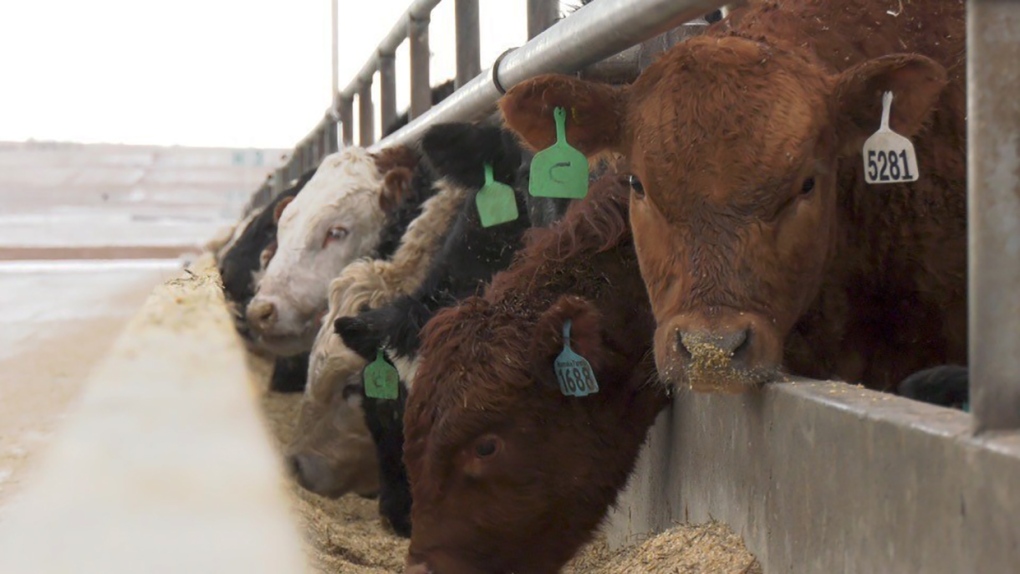Alberta feedlot operators running low on grain for cattle
 Some of the cattle at Namaka Farm operated by Stuart Thiessen who says delayed shipments of feed from the US are impacting his business
Some of the cattle at Namaka Farm operated by Stuart Thiessen who says delayed shipments of feed from the US are impacting his business
The drought farmers experienced in 2021 is impacting feedlot operators in the province. Crops last summer didn't yield much grain that cattle producers need to feed their animals. Now they're relying on corn and dried distillers' grains from the U.S., but COVID-19 has thrown a wrench into the supply chain.
"There's been delays in shipments on the rail side, we're short of labor, we're short of truck drivers, it's just kind of been the perfect storm," said Janice Tranberg, president and CEO of the Alberta Cattle Feeders Association.
Tranberg says feedlot operators all over the province are impacted by delays in shipping. Typically cattle feed is a combination of silage and barley to help animals bulk up before processing. But now operators are mixing corn with the barley and will switch to all corn when the barley runs out. And they're relying on those corn shipments that are delayed.
"And honestly, there's been a few feedlots that have contacted me that they are right at the very bottom of the bin," said Tranberg. "So it's now becoming a pretty big issue."
SKYROCKETING DEMAND
Tranberg says in 2020, 600 railcars of corn were shipped from the U.S. As of mid-December 2021 that number had skyrocketed to 8,000 and the need continues to increase early in 2022.
"We have weekly calls with our rail colleagues and with our grain companies helping them to understand what the need is," she said.
Canadian Pacific Railway said in a statement, "Customer demand to ship corn and dried distiller's grains for cattle feedlots increased significantly in 2021. That increased demand has continued into 2022."
It continues, "CP is committed to servicing our customers and playing a role in enabling feed to be supplied to feedlots during this challenging crop year."
Stuart Thiessen runs Namaka Farms southeast of Strathmore. He has 21,000 head of cattle and he has about two weeks of feed left in his bins to feed them. He's frustrated by the delay in shipping.
"I'm definitely hearing that the trains are sitting in the US or not getting here, sitting in South Dakota and not getting here," said Thiessen. "We're hearing that trains are sitting for 10 days before they're getting picked up by our local guys that bring it in."
Thiessen says he's hearing some other feedlot operators are running low on feed. He has a contingency plan to switch his cattle to a maintenance diet rather than a bulk diet if his supply gets too low.
"If grain quit coming from the US, honestly, (the cattle would) ultimately starve," he said. "I wish I could tell you a nicer (outcome), we don't even have the capacity to harvest them quickly right, like they would all honestly starve, that's where it would end."
Thiessen says there are five generations of his family that have run the farm and he's never seen a feed shortage like this.
Tranberg continues to work with the railway and government to come up with a solution to increasing shipments of feed from the US.
"This is animal welfare," said Tranberg. "This is feeding animals right, so I think making that connection on how much of a priority it is has helped."
But Thiessen has no idea when his next shipment will arrive.
CTVNews.ca Top Stories

U.S. president-elect's son shares post on X of Donald Trump buying Canada on Amazon
U.S. president-elect Donald Trump and those in his corner continue to send out strong messages about Canada.
Economists say more room to fall as Canadian dollar continues downward trend
Experts say the next few months are going to be rough for the Canadian dollar as it appears set to continue its downward trend.
Trudeau could stay or go. Either way, Canadians should brace for a spring election
Canada appears to be barrelling toward a spring election now that the NDP is vowing to vote down the government early next year -- whether Prime Minister Justin Trudeau stays on or not.
Balkans snowstorm leaves tens of thousands of homes without power, causes traffic chaos
Tens of thousands of homes in Bosnia were without electricity on Tuesday after more heavy snow and winds that also brought traffic chaos in neighbouring Croatia and Serbia.
5 rescued after avalanche triggered north of Whistler, B.C. RCMP say
Emergency crews and heli-skiing staff helped rescue five people who were caught up in a backcountry avalanche north of Whistler, B.C., on Monday morning.
Quebec fugitive killed in Mexican resort town, RCMP say
RCMP are confirming that a fugitive, Mathieu Belanger, wanted by Quebec provincial police has died in Mexico, in what local media are calling a murder.
American imprisoned in Russia sentenced to new 15-year jail term for espionage
A Russian-born U.S. citizen already imprisoned in Russia on a bribery conviction has been handed a second 15-year jail term for espionage, Russian news agencies reported Tuesday.
Revised airline compensation rules will do little to change status quo: experts
Proposed changes to Canada's passenger rights charter will perpetuate loopholes that allow airlines to forego compensating travellers whose flights are disrupted, say airline experts.
Parties agree on the need to act on online harms, but time is running out for new law
Justice Minister Arif Virani is unapologetic about the money it would take to set up new regulators to tackle online harms under his proposed legislation.


































